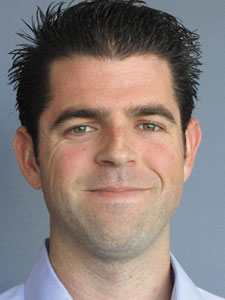Nicholas Scurich
 University of California, Irvine
University of California, Irvine
http://socialecology.uci.edu/faculty/nscurich
What does your research focus on?
Broadly speaking, I study psychology and law. The general theme of my research is judgment and decision making in the legal system. I also study violence risk assessment and risk communication.
What drew you to this line of research and why is it exciting to you?
One person in particular drew me to this area of research. As an undergraduate majoring in physics, I took an elective course entitled Law and Psychology, which was taught by Tom Lyon (University of Southern California), a law professor/psychologist. By the third lecture, I had changed my major to Psychology. I was enthralled. Tom is one of the few people for whom the aphorism “best teacher ever” is not hyperbole, and it is undoubtedly his erudition that initially drew me to the field.
In general, I find this area fascinating because the science and its social implications are so deeply entwined. The prospect of using science to inform and improve the quality of the legal system is encouraging, though this interrelatedness can be a double-edge sword because it tends to encourage research that is atheoretical. I try to ensure that my own research, even if it is motivated by an existing social problem, is theory driven, and, to the greatest extent possible, “objective” in the sense that it’s not pushing an agenda.
Who were/are your mentors or scientific influences?
It would be impossible to overstate the contribution of Richard S. John to my accomplishments. John, who was my undergraduate and graduate advisor, always furnished superb guidance on conducting behavioral research, and I am most grateful for his introduction to the fascinating world of Bayesianism. I was also fortunate to work closely with three extraordinary law professors, Dan Simon, Tom Lyon, and Ellen Saks, each of whom generously shared their insight and wisdom. My research has greatly benefited from this eclectic upbringing.
Two other psychologists have been highly influential to me. The first is Paul Meehl, who I believe is one of the most important psychologists of the 20th Century. Every student of psychology ought to read at least some of his work; his APS Cattell award speech on “The Power of Quantitative Thinking” is highly recommended. From a substantive standpoint, John Monahan’s scholarship has had the greatest influence on my own research program. His seminal work on risk assessment is a paragon of interdisciplinary research.
What’s your future research agenda?
Although I have several ongoing projects, I’m especially excited about my collaborative research with Dan Simon, which examines how the lay public reacts to judicial decisions and the unique style of argumentation that accompanies them. This line of research seeks to understand the psychological dynamics that distort the perception of the law’s neutrality, and how legal decision makers might counteract such dynamics.
What publication are you most proud of?
Scurich, N., & Krauss, D. A. (2013). The effect of adjusted actuarial risk assessment on mock-jurors’ decisions in a sexual predator commitment proceeding. Jurimetrics Journal, 53(4).
Perhaps it’s a recency effect, but this paper is a new favorite because it touches on several areas of psychology. It primarily addresses a practice that is germane to forensic psychology (i.e., adjusting actuarial risk estimates), however it also replicates the social psychological theory of Motivated Reasoning in a novel context, and it has implications for the legal admissibility of expert testimony.





APS regularly opens certain online articles for discussion on our website. Effective February 2021, you must be a logged-in APS member to post comments. By posting a comment, you agree to our Community Guidelines and the display of your profile information, including your name and affiliation. Any opinions, findings, conclusions, or recommendations present in article comments are those of the writers and do not necessarily reflect the views of APS or the article’s author. For more information, please see our Community Guidelines.
Please login with your APS account to comment.